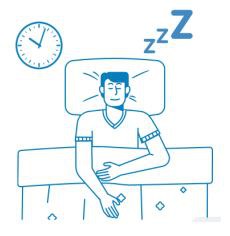What is sleep?

- Sleep is a natural way of resting our body and mind.
- Sleep is regular cycles of deep and light sleep throughout the night.
- Each cycle takes between 90 and 120 minutes. You will generally have around five cycles in a normal sleep period. Waking up during sleep is a normal part of healthy sleep.
- Most people wake briefly from light sleep throughout the night but will probably not remember being awake. These periods of being awake do not generally change your ability to function during the day.
- The need for sleep is guided by your internal body clock. When your body clock is timed normally, sleepiness is high at night time and low in daytime.
- If you have problems falling asleep, please talk to health staff.
There is no exact amount of sleep that is right for every person. You might feel rested with six hours sleep, or you might need 10 hours sleep. It depends on your age, health and activity.
What are the best ways to deal with sleep problems?
- Using medication to help you sleep is not a good idea and can often cause more sleep problems.
- The nurses and doctors do not usually prescribe medication to help you sleep.
- If you have a problem sleeping, the best way to deal with it is with Cognitive Behavioural Therapy (CBT).
- CBT is used to help people change their thoughts, feelings and behaviors that are causing them problems.
- It can help change the way you think about sleep and your behaviours around sleep.
- CBT is delivered by psychologists over several sessions. It helps in the long term even after the therapy is finished. You can ask to see a psychologist (employed by CSNS or Private Security Provider) for CBT if you need help with sleep problems.
How is sleep in custody different?
It is common to have problems sleeping in custody. You might find yourself “doing head miles” (worrying about all sorts of things), and having problems falling asleep, or waking often through the night.
Your ability to sleep can be made worse by:
- Being in an unfamiliar place
- Feeling worried
- Waiting to go or going to Court
- Worrying about being released
- Worrying about things at home
- Not having access to drugs, alcohol or cigarettes
- Having to share a cell with a person you don’t know well
- Having nothing to do through the day and feeling bored
Other things that can stop you from sleeping well:
- Using illicit and or un-prescribed drugs
- Smoking ‘tea-bacco’
- Drinking large amounts of drinks with caffeine such as coffee or coke
- Having drinks with caffeine and/or sugar at night
- Having the TV on while trying to sleep
- Eating late in the night
- Exercising late in the evening
- Sleeping during the day
How can I sleep better in custody?
Here are some things you can do to help you sleep better:
- Eat less sugar and drink less coffee, tea, energy drinks and other sugary drinks
- Make water your main drink.
- Stop using ‘Tea-bacco’ and cigarettes
- Avoid daytime naps
- Don’t eat late in the evening or late at night
- Avoid bright lights from TV - keep the room dark if possible
- Use earplugs to block out noise if you have them
- Try some relaxation exercises before going to bed
- Be active every day but don’t exercise close to bed time. Moving your body for at least 30 minutes every day is a good thing for many reasons
- Speak to a nurse or doctor for more ideas

